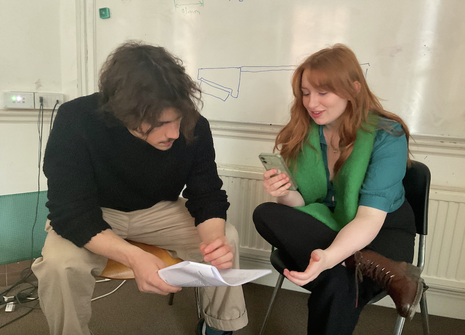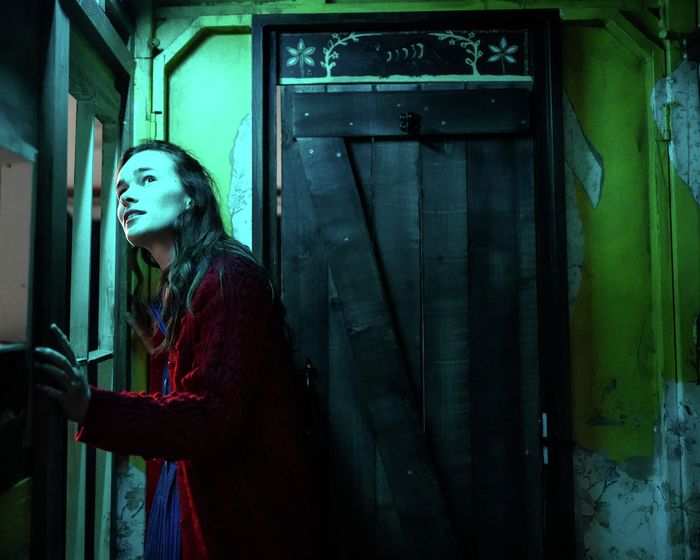Skylines soars and stumbles
This theatrical exploration of life in London’s high-rise buildings is full of highs and lows

Isabella Bottle’s original play has an undoubtedly intriguing concept. The audience is shown a snapshot into the lives of four Londoners dealing with the anxieties of their ever-growing city, both upwards with skyscrapers and downwards with the London Underground. We meet Lily (Lexie Graham) and Archie (Seb Gentile) as they approach their one-year anniversary of moving into a skyscraper, but the pair have still not fully settled into their home: Archie insists on using the stairs instead of the lift, despite the building’s height, and Lily laments the loss of the community they had in their old neighbourhood. When writing an article about the proliferation of high-rise buildings, Archie meets Mr Cayder (Francesa Lees), a construction worker balancing his fascination in seeing the world from above with his grief over losing a colleague on the job; and Lily reconnects with a grieving old neighbour, Ivy (Lucy Brougham. Bottle’s suspended conversion of the two storylines brings an unmissable element of mystery and tension to this novel work..
Set between the World Wars, the show does an excellent job of combining timeless issues, such as navigating the overcrowded Tube or the claustrophobia of a lift, with period-specific concerns, the trauma of memory from the First World War and fears of the inevitable Second. Memories of the war are woven into the tapestry of everyday life, with casual references to aerial photography “like we used in the war,” or women covering jobs at the post office. The clarity of the setting is admirably developed, and does not come at the cost of alienating a twenty first century audience.
“Memories of the war are woven into the tapestry of everyday life”
Not simply an interesting backdrop, the choice of time period actively supports the play’s themes. Mr Cayder and a colleague (also played by Lucy Brougham) discuss losing contact with people they fought with in the war, providing a direct parallel to Lily’s dismay at drifting away from her neighbours. Archie draws a comparison between the constant, almost desperate, growth of London’s architecture and the years he spent fighting over physical space for his country. Bottle’s blending of post-war attitudes with contemporary fears expertly create a near impossible atmospheric duality of past and present.
Unfortunately, for a play so focused on architectural heights, there were moments where it fell rather flat. While the Corpus Playroom’s basement-like atmosphere may work well for more intimate productions, it presents a challenge for more ambitious plays, and I was left unconvinced that the characters were travelling to the highs and lows of the city.
“As an audience member, the lack of catharsis was frustrating”
There were several moments in the play where I found myself wanting more. The tension between Lily and Archie is palpable from the opening scene, when it becomes clear that neither of them are truly happy in their block of flats. Graham’s and Gentile’s performances shine through opposite each other, capturing Lily and Archie’s genuine dedication to their relationship, tinged with an exhaustion that comes with seeing your partner in a constant state of discontent. Yet the audience were not treated to an explosive moment, a full release of pressure, that was desperately craved after the extensive period of emotional strain presented by the cast.
Lily’s discovery of the death of Ivy’s husband felt equally underwhelming for what should have been a climactic point. The several hints granted to the audience, with repeated references to abstract “accidents” and “dangers,” should have built to this final, conclusive piece of the puzzle. And yet I felt the script become more concerned with long speeches on perspective and insignificance atop tall buildings than on the very much grounded grief of Ivy. Perhaps this was the intention, to demonstrate how these tensions and tragedies are just another part of everyday life, but, as an audience member, the lack of catharsis was frustrating.
Overall, Skylines has a strong concept, and a lot of potential. Even when the central idea felt like it was straining at the seams of the Corpus Playroom, the believability of the characters against the well-developed backdrop of the interwar period was enough to keep the audience’s interest in this compelling production.
Skylines is showing at the Corpus Playroom until the 27th of January.
 News / Hundreds of Cambridge academics demand vote on fate of vet course20 February 2026
News / Hundreds of Cambridge academics demand vote on fate of vet course20 February 2026 News / University Council rescinds University Centre membership20 February 2026
News / University Council rescinds University Centre membership20 February 2026 News / Judge Business School advisor resigns over Epstein and Andrew links18 February 2026
News / Judge Business School advisor resigns over Epstein and Andrew links18 February 2026 News / Petition demands University reverse decision on vegan menu20 February 2026
News / Petition demands University reverse decision on vegan menu20 February 2026 News / Caius students fail to pass Pride flag proposal20 February 2026
News / Caius students fail to pass Pride flag proposal20 February 2026










